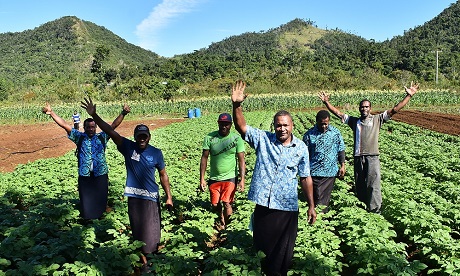Caritas Aotearoa New Zealand’s (CANZ) first report on a seven-country programme in the Pacific and Southeast Asia shows the new programme is progressing well.
Oranga Taurikura – A Thriving Life – is a 5-year integrated development programme which CANZ leads.
It works through established community organisations to provide food and water security, build healthy lifestyles, and strengthen agriculture and income-earning opportunities. These aim to help communities to be more resilient in the face of climate change and other challenges.
New Zealand donors and the Ministry of Foreign Affairs & Trade’s New Zealand Aid Programme support Oranga Taurikura’s aims.
CANZ’s report covers the period from July 2021 to December 2022. It shows CANZ’s grassroots partners have been highly adaptable through the COVID pandemic and in other crises and disasters. Oranga’s development, design and initial implementation happened mostly during the COVID emergency.
The Pacific and Southeast Asia region programme aims to reach more than 90,000 people in Cambodia, Fiji, Kiribati, Papua New Guinea, Solomon Islands, Timor-Leste and Tonga in the five-year period ending June 2026.
Progress towards reaching all five specific outcomes set for the new programme is being made, the Caritas report says.
These five outcomes are described below with a description of a few of each specific outcome’s successes.
Outcome 1 – Improved Food and Water Security and Healthy Lifestyle
Examples:
- In Fiji, the report notes by June 2022, Tutu Rural Training Centre (RTC) was able to supply about 50,000 vegetable and fruit seedlings and cuttings extra to its usual output. The Centre has also expanded its Women in Agriculture programme.
- In Papua New Guinea, Caritas PNG is planning for sustainability of accessible water infrastructure and food security.
Outcome 2 – Strengthened Climate and Disaster-Prepared Households and Livelihoods
There has been significant progress towards workplans in relation to this outcome.
Examples:
- In Cambodia, DPA conducted training in Disaster Risk Reduction (DRR), agriculture, leadership and financial literacy. It also began investigating cacao production with target farmer associations.
- In the Solomon Islands, a supervisor briefing and four locally-provided training courses were implemented.
Outcome 3 – Local Partners
The report notes local partners are more effective at implementing agreed programme objectives and scaling up.
Examples:
- Development Partnership in Action (DPA) in Cambodia has repeatedly demonstrated high capability in changing contexts to progress agreed outcomes. It has robust systems and well-proven methods and approaches, and considerable networks across Cambodia.
- Local leadership in many of the seven districts in Timor-Leste where HAFOTI Shelter for the Timorese Woman operates. Opportunities for further professional development and training are available.
Outcome 4 – Strong Community Voice and Influence in Decisions that Impact Their Lives
Example:
- The DPA in Cambodia allowed withdrawal from Community Land Titling (CLT) activities for villages that do not wish to continue.
Outcome 5 – Increased Public Engagement and Support
Examples:
New Zealand provided a range of resource and support during the reporting period.
- Two CANZ appeals in 2021 and 2022 promoted the programme and partners through CANZ’s website, newsletters, educational material, parish visits, direct donor engagement events and social media updates.
- CANZ has supported and helped implementing partners develop the ability to collect and share promotional material.
Source
Additional reading
News category: New Zealand.




